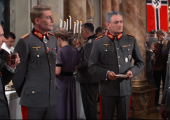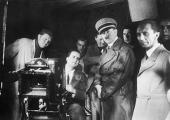Never Look Away review - the healing potential of art



Politics, in case you may not have noticed, has been in the air of late: questions of escape, release, borders, refugees, things like that. So WNO’s June season of operas about freedom has been suspiciously well timed. We’ve had the dead man walking (Jake Heggie’s opera, but you may have your own candidate), we’ve had Menotti’s visa opera The Consul, Dallapiccola’s study of hope deceived in Il prigioniero, and Beethoven’s of despair conquered by woman in Fidelio.

Stalingrad is the companion piece to Vasily Grossman’s Life and Fate, which on its (re)publication in English a decade ago was acclaimed as one of the greatest Russian (and not only Russian) novels of the 20th century.

Anatole Litvak’s The Night of the Generals (1967), beautifully restored here to 4K, is a tortuous and at times entertaining mash-up of the July 1944 plot to kill Hitler and the murder of a prostitute in Nazi-occupied Warsaw a few years earlier.

Maggie Smith is not only a national treasure, but every casting director's go-to old bat. Now 84 years young, she is our favourite grande dame, or fantasy grandma.

There is nothing quite like the Iffland-Ring in this country. The property of the Austrian state, for two centuries it has been awarded to the most important German-speaking actor of the age, who after a suitable period nominates his successor and hands the ring on. There were only four handovers in the entire 20th century. The most recent of them was in 1996, when the Swiss actor Bruno Ganz became the new lord of the ring.

Wolfgang Petersen’s film Das Boot is now nearly 40 years old, but in this new TV sequel time has moved forward a mere nine months from the original story, into the autumn of 1942. Whether it’s still springtime for Hitler is moot, but the U-boat crews based at La Rochelle are locked in a grim struggle with both the Atlantic and with Allied ships and aircraft.

When they were children the interviewees in this film – the last survivors – were taken away in incomprehensible circumstances, on their way to be murdered for who they were, in Germany and places further east.

This is a love story and a ghost story. The year is 1934 and the Held family have moved from the countryside to an elegant house on Katalin Street in Budapest. Their new neighbours are the Major (with whom Mr Held fought in the Great War) and his mistress Mrs Temes, upright headteacher Mr Elekes and his slovenly and unconventional wife Mrs Elekes.

Apart from Leni Riefenstahl’s insidiously seductive celebrations of Nazism and the propaganda excesses of Veit Harlan’s Jud Süß (1940), the films that were made in Germany during the Hitler period have been air-brushed out of cinema history, almost in mirror image of the culture that was entartet, or